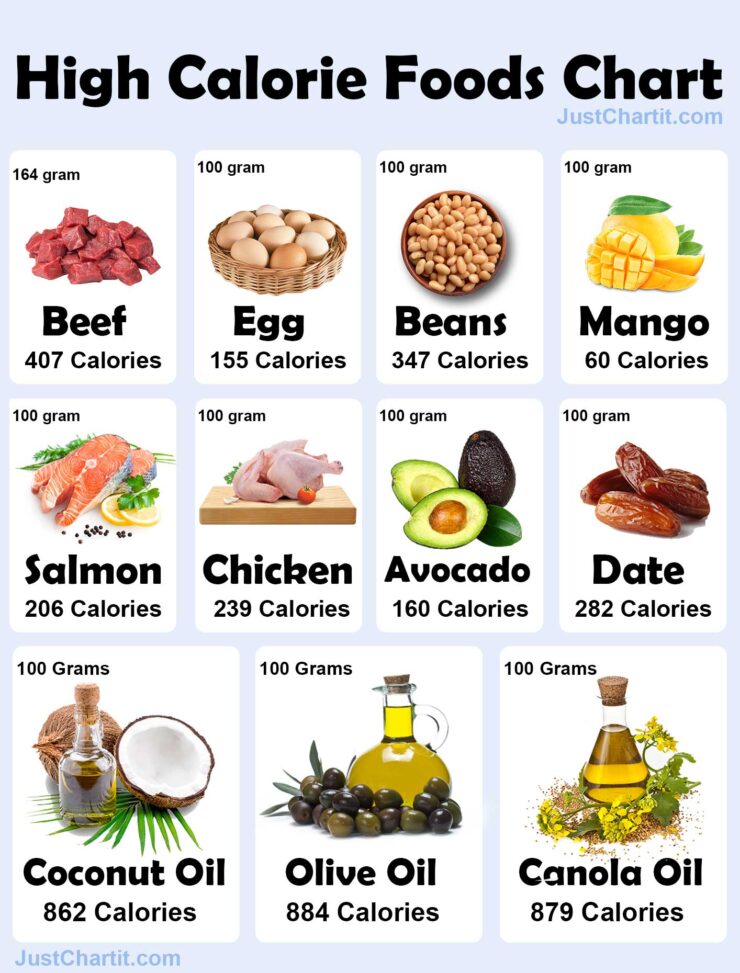Calories are essential for our body to perform its daily function properly. People try to cut as many calories as they can. But, eating right and healthy calories help you go a long way.
High-calorie foods can be beneficial if added to the food portion the correct way. High-calorie foods do not tend to be high in fats.
A high-calorie diet can help you healthily gain weight and saves you from a bunch of diseases. You can acquire high calories through certain Vegetables, meat, nuts, and fruits.

BEEF
Beef is also known as red meat. It comes from cows and bulls. One hundred and sixty-four grams of beef contains 407 calories.
Beef is a rich source of protein. Beef contains several minerals essential for human life, e.g., iron, zinc, phosphorus, magnesium, and potassium.
Vitamins such as riboflavin, niacin, vitamin B6, and, B12 are present in beef as well. However, there is no fiber content in beef. Beef is also a good source of antioxidants that promote metabolism and human health.
Beef by nature is rich in protein which helps in muscle growth including tissue development. It also provides iron and four essential vitamins that reduce tiredness and fatigue. On the whole, beef calories play a role in maintaining human health.
Also Read: Zinc Rich Foods Chart
Eggs
Humans get eggs from poultry. A hundred grams of eggs contain 155 calories. Eggs are the perfect source of protein because all nine essential amino acids are present in them.
They are a good source of vitamins and minerals such as copper, iron, and zinc with zero fiber content. The two antioxidants in eggs are called lutein and zeaxanthin.
These protect our eyes. They provide good cholesterol that is beneficial for our heart’s health. The protein present in eggs helps to maintain body tissues. Eggs give the feeling of satiety and help with weight management.
Beans
Beans provide vegetable calories. They are a good source of proteins. Minerals such as iron, magnesium, and potassium are also present in them.
They have a fiber content of 16 grams. 100 grams of beans contain 347 calories. They are also high in natural antioxidants. Beans have many health benefits.
They are rich in proteins which are necessary for maintaining and repairing the body. They contain many vital nutrients like folate that help in creating healthy red blood cells. Improve heart health as well as reduce the risk of cancer.
Also Read: Use this Calorie Density Chart to Make Smart Food Choices
Mango
Mango is harvested in the summer season and is famous for having different kinds. The fruit is known for its exceptional sweet taste and the many nutritional advantages it possesses.
A 100-gram of mango contains 60 calories. It has 20 different vitamins e,g., vitamin A, C, and K. Minerals like potassium, folate, and magnesium are also present.
It has a fiber content of 1.6 grams. Mango is low in fruit calories. It is also high in antioxidants such as beta-carotene. It helps in boosting immunity and supports heart health as well as improving digestive health.
Salmon
Salmon is a very commonly known fish. It is very rich in proteins and omega-three fatty acids that are best known for their role in improving cardiac health. It also contains potassium and nutrients such as iron.
Salmon is high in protein with zero amounts of carbohydrates. It is a perfect option for dinner. 100 grams of salmon contains 206 calories.
Also Read: Fish Calories Chart
Chicken:
The chicken comes from poultry. It is also known as white meat. It is a great option when following a balanced diet. Other than proteins, it is a good source of minerals as well.
Chicken mainly provides vitamins from the vitamin B complex. Chicken contains the amino acid tryptophan which gives a higher level of serotonin. 100 grams of chicken contains 239 calories.
Avocado
100 grams of avocado contain 160 calories and fiber content of 7 grams. Avocados are a good source of vitamins like vitamins C, E, K, B6, riboflavin, and niacin. It contains omega-three fatty acids.
They also provide minerals such as folate, magnesium, and potassium and antioxidants such as lutein and beta-carotene. Avocado is a source of oleic acid that helps to lower cardiovascular inflammation.
Also Read: Chilis Calories Chart
Date
Dates are known to be nutritious. They contain nutrients that boost metabolism and increase immunity against diseases.
Dates contain proteins, potassium, magnesium, and copper, and vitamins like vitamins C, A, thiamine, riboflavin, and niacin. Dates have a fiber content of 8 grams.
Dates are high in disease-fighting antioxidants. They also promote brain health. 100 grams of dates contain 282 calories.
Coconut oil
100 grams of coconut oil contains 862 calories. Coconut oil contains vitamin E. It does not have any fiber or other vitamins or minerals and is almost 100% fat.
Coconut oil encourages the burning of fat. It helps to prevent seizures and raises good cholesterol. It also helps to protect our hair, skin, and teeth.
Also read: Protective foods list
Olive oil
100 grams of olive oil contains 884 calories. It has 14 percent of saturated fat and 73 percent of monosaturated fat. It also contains vitamins E, A, and K and minerals such as iron, magnesium, and potassium.
Olive oil has many health benefits. It is great for eyes, skin, bone, and cell health and for improving our immune system as well.
Canola oil
Canola oil is the most commonly used form of fat for cooking. 100 grams of canola oil contains 879 calories. Canola oil is a rich source of omega-three and omega-six fatty acids.
Its nut calories help to cut down levels of cholesterol. It contains vitamins E and K. It can reduce skin problems such as acne, wrinkles, and spots. It also reduces inflammation and stiffness of joints.
